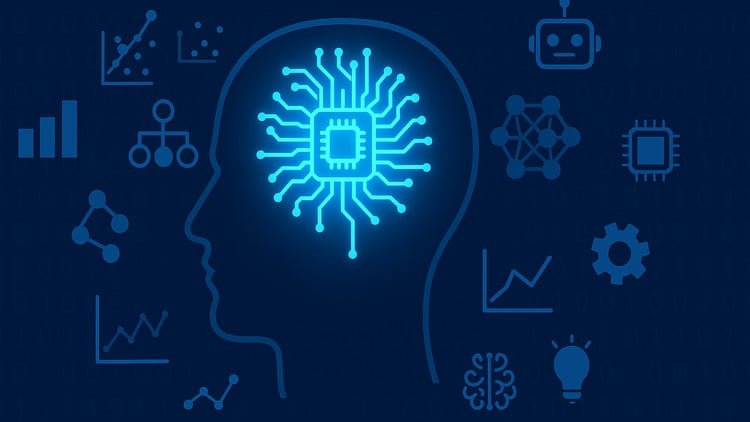
Learn the core concepts of AI & Machine Learning, from basics to real-world applications, step by step
What you will learn
Understand the fundamentals of AI and ML
Apply core mathematical and statistical principles
Build and evaluate basic machine learning models
Understand and implement deep learning concepts
Identify and address ethical challenges in AI
Gain practical experience with AI tools and workflows
Add-On Information:
Note➛ Make sure your 𝐔𝐝𝐞𝐦𝐲 cart has only this course you're going to enroll it now, Remove all other courses from the 𝐔𝐝𝐞𝐦𝐲 cart before Enrolling!
- Demystify the Intelligence Engine: Unravel the foundational principles that power artificial intelligence and machine learning, moving beyond the hype to grasp the underlying mechanisms.
- The Science Behind the Smarts: Explore the essential mathematical and statistical underpinnings that form the bedrock of ML algorithms, making complex concepts accessible.
- Crafting Predictive Power: Develop the ability to construct and rigorously assess introductory machine learning models, learning to interpret their performance.
- Delving into Deep Networks: Gain insight into the architecture and functionality of deep learning, understanding how neural networks learn and adapt.
- Responsible AI Stewardship: Equip yourself with the critical thinking skills to recognize and navigate the ethical considerations and societal impacts of AI deployment.
- Hands-On AI Toolkit Mastery: Acquire practical proficiency with essential AI development tools and streamlined workflows, enabling you to translate theory into action.
- Algorithm Exploration: Venture beyond basic models to explore a spectrum of supervised, unsupervised, and reinforcement learning techniques, understanding their use cases.
- Data as the Driving Force: Comprehend the critical role of data in AI, from preprocessing and feature engineering to understanding data bias and its implications.
- Model Interpretation & Debugging: Learn to not just build models, but also to interpret their decision-making processes and diagnose common errors.
- The Lifecycle of an AI Project: Understand the end-to-end process of an AI initiative, from problem definition and data acquisition to model deployment and monitoring.
- Bridging Theory and Application: Connect abstract AI concepts to tangible real-world applications across various industries, seeing the practical impact of these technologies.
- Foundational Vocabulary and Concepts: Build a strong command of the terminology and conceptual framework that defines the AI and ML landscape.
- Feature Engineering Essentials: Discover techniques for transforming raw data into features that effectively communicate information to ML algorithms.
- Model Evaluation Metrics Deep Dive: Understand a comprehensive suite of metrics for evaluating model performance, beyond simple accuracy.
- Introduction to Neural Network Architectures: Gain an overview of fundamental neural network structures and their specialized applications.
- AI Ethics Frameworks: Explore established frameworks and principles for developing and deploying AI in an ethical and responsible manner.
- Workflow Automation with AI Tools: Learn how to leverage AI platforms to streamline and automate complex analytical and development processes.
- Building Intuition for Learning: Cultivate an intuitive understanding of how algorithms “learn” from data, fostering a deeper appreciation for the process.
- Pros: Comprehensive Coverage: Provides a well-rounded introduction to both AI and ML. Practical Skill Development: Focuses on applying learned concepts. Industry Relevance: Covers skills highly sought after in today’s job market.
- Cons: Introductory Depth: May not delve into highly specialized or advanced topics within AI/ML.
English
language